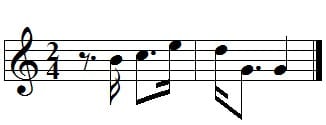Add dots where necessary to make the bars complete.
Lessons
- Grade 1: Accidentals
- Grade 1: Adding missing bar lines
- Grade 1: Intervals
- Grade 1: Key signatures
- Grade 1: Major scales
- Grade 1: Notes & note values
- Grade 1: Questions on a melody
- Grade 1: Simple time signatures
- Grade 1: Single dotted notes & rests
- Grade 1: Terms & Signs
- Grade 1: The Stave
- Grade 1: Tonic Triads
- Grade 1: Treble & bass clefs
Grade 1: Single dotted notes & rests: Introduction
A dot after a note or rest makes it half as long again.
The dot needs to go just to the right of the note or rest. If the note-head is in a space, the dot goes in the same space; if the note-head is on a line, the dot normally goes in the space just above the line, like this:

Grade 1: Single dotted notes & rests
Grade 1: Single dotted notes & rests
Download the following questions or write the notes on manuscript before completing.
Question 1
How long does each note last? The first answer is given.

Answer 1
See the image for the answers.

Question 2




Answer 2
Take a look at the images for the answer




Rests: Introduction
The semibreve rest hangs below a line, usually the fourth line, like this:

The minim rest sits on a line, usually the third line, like this:

The crotchet rest is shown like this:

The quaver rest is shown like this:

The semiquaver rest is shown like this:

Rests Question 1
Add a rest at the places marked * in this melody to make each bar complete.

Rests Answer 1
The second bar uses a semibreve rest, this is the rest we use for a completely silent bar in any time signature except 4/2. The crotchet rest in bar three makes up the missing first crotchet beat. In bar four we use the minim rest for the final two beats. Note: in 4/4 time if the first or last half bar is completely silent we use the minim rest not two crotchet rests.

Rests: Question 2
Add a rest at the places marked * in this melody to make each bar complete.

Rests: Answer 2
The quaver rest is used in bar one to make up our third beat. The third beat in bar three is completed by using the crotchet rest.

Rests: Question 3
Add a rest at the places marked * in this melody to make each bar complete.

Rests: Answer 3
The second beat in bar one is completed by using the semiquaver rest. We use the crotchet rest to complete the second beat in the last bar.

Rests: Question 4
Add a rest at the places marked * in this melody to make each bar complete.

Rests: Answer 4
The minim rest is used in bar one to complete the missing two crotchet beats. Remember in 4/4 time a completely silient half bar at the beginning or end of the bar is shown with a minim rest not two crotchet rests. Bar two needed a crotchet rest for the first beat and a quaver rest was used in the final bar to make up a full crotchet beat.
